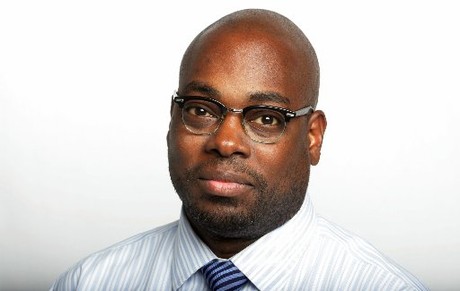Tragedy and Triumph out of a Strike
Stephen Henderson’s essay remembering the 25th anniversary of the Detroit Free Press and Detroit News Strike

Stephen Henderson:
Welcome to Detroit Today on 101.9 WDET. I’m Stephen Henderson and thanks for joining us this Monday, July 13.
I want to start the show today with an idea, a very simple one.
Sometimes, the worst things that happen to us lead us to the best things we might imagine.
Tragedy can lead to triumph, of course but beyond that—and even more common perhaps—loss can lead to learning and experience that we might never have gained if life didn’t throw us for loops, or take precious things from us.
And today, July 13, 2015, I’m thinking about a very specific part of my life that captures that dynamic.
Twenty-five years ago today, 2,500 workers at the Detroit News and Detroit Free Press walked out of work to begin one of the largest labor actions in the city’s modern history.
I was one of those workers: a 24-year-old reporter at the Free Press, covering Detroit Public Schools and having a blast.
On July 13, the negotiations between the newspapers’ management and the unions finally broke down, and at about 4:30 p.m., the strike deadline hit. I was sitting in the newsroom with two of my partners on the education beat, and we were working on a very big story about missing bond money.
But right at 4:30, we killed the story out of the computer system, packed up our things, and walked out the door –past editors who were our bosses and in many cases our friends, away from a paper and from jobs that most of us deeply loved.
There was no question for me: The strike was not what I wanted. I thought there were better ways to get what we were after, and I feared that all of us leaving would prove, ironically, that the papers would survive without us. And they did – they came out every day, and even in their emaciated form, with strange bylines and precious few stories, that daily delivery was a death knell to our cause.
Personally, the strike was devastating. At 24 years old, without work, I wasn’t sure what to do each morning. I spent weeks sitting every day in the dark in my house in Woodbridge, trying to figure out a way forward. I did picket duty and attended strike meetings, but I couldn’t overcome the piercing sense of loss, almost like a death. The job I loved, at the newspaper in my hometown, seemed like it would be gone forever.
But eventually, I decided I needed to move on. After four months without a paycheck, I went back to the newsroom to claim my job. But I’d already decided it was too different, and too sad, to stay. So I left, and went to work at the Chicago Tribune – a city, and a paper that I had no real connection to. It was a move that made me fearful, and it accentuated my sense of loss over the situation in Detroit.
But you know what? I learned a ton in Chicago – about the growth of digital news distribution, about how another city solved its problems, about how another newsroom covered a major metropolitan area.
Soon after, I went to Baltimore, and then to Washington, D.C. – in each place, seeing and experiencing things I would never have encountered back home in Detroit.
And, after 12 years away, I finally moved back home to Detroit, to help lead the Free Press. I began to write a column as editorial page editor – and the insights and experience I’d gained in Chicago and Baltimore and Washington all shone through in the writing in a way that made the work more satisfying, as well as more respected.
And there were other lessons from the strike too – about the cold realities of labor’s place in the business world, about the dizzying changes that were unfolding in the news business, and about the meaning of real friendships, versus the triviality of convenient acquaintances.
I saw relationships end and others begin during the strike – and I think everyone involved, no matter how old they were or how long they worked for the paper, did some growing up on the picket lines.
The truth is, without the strike, without the sudden loss of my place at the Free Press when I was 24, I doubt I might have ever left Detroit to go to other places, cover other parts of the world, and see how things work outside the Motor City. And the growth that came from the hardship of the experience would have been hard to come by in other contexts.
The strike was devastating, but ultimately, for me, it was a change that brought on experiences I can’t imagine living without today.
It was an ironic, twisted blessing – one that I could never have predicted as it was unfolding.
And I can’t count how many of my former colleagues had the same experience – they left Detroit, or left the newspaper business, and found not just contentment or comfort, but new pinnacles and peaks that they would probably have not reached had we all stayed.
Tragedy, in so many cases, led to triumph. And loss led to learning and experience.
Twenty years later, I can still cry, if I think hard enough, about the loss I felt when the strike started and we walked out the door of the Free Press. But in truth? I’m not sure I’d trade what I gained on the journey the strike inspired. Not for anything.
Views expressed in Stephen Henderson’s essays are his own and do not necessarily reflect those of WDET, its management or the station licensee, Wayne State University.
